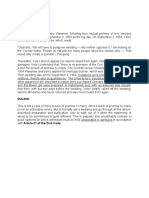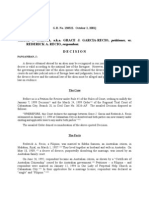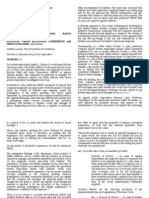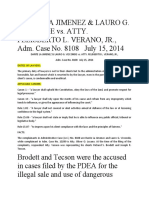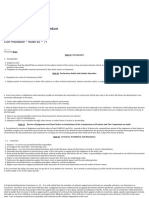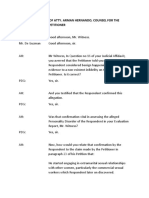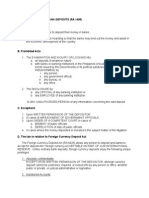PFR Reviewer
PFR Reviewer
Uploaded by
Man HernandoCopyright:
Available Formats
PFR Reviewer
PFR Reviewer
Uploaded by
Man HernandoCopyright
Available Formats
Share this document
Did you find this document useful?
Is this content inappropriate?
Copyright:
Available Formats
PFR Reviewer
PFR Reviewer
Uploaded by
Man HernandoCopyright:
Available Formats
Civil Code Preliminary Title Chapter I: Effect and Application of Laws August 30, 1950 date of effectivity of the
e Civil Code (RA 386). This date is one year after the Oficial Gazette publishing the Code was released for circulation. Art.2 Effectivity of Laws (amended by EO 200) General rule: 1. A law may provide for its own effectivity. 2. If the law is silent as to its own effectivity, it shall take effect only after 15 days following its complete publication. Publication requirements: 1. 2. May either be published in the Official Gazette or in a newspaper of general circulation. Publication must be in full.
Laws covered All kinds of domestic laws, civil or penal, substantive or remedial. Mandatory or prohibitory except permissive laws. Other exception: 1. Foreign laws ignorance of it is only cosidered as a mistake of fact not a mistake of law.
Doctrine of processual presumptionif the foreign law involved is not properly pleaded and proved, the court will presume that the foreign law is the same as our local or domestic or internal law. Cases: 1. Marbella-Bobbis v BobbisRespondent Isagani Bobbis cannot successfully invoke ignorance of the existence of Article 40 of the Revised Penal Code to be saved from the prosecution of bigamy. Every person is presumed to know the law. Consunji v CA ignorance of the provisions of the Civil Code demanding cost of damages higher than those provided by the Workmens Compensation Act cannot be held against the respondent because respondents decision only constitutes a mistake of fact.
Meaning of Clause Unless It Is Otherwise Provided It refers to the date of effectivity and not to the requirement of publication itself, which cannot in any event be omitted. This clause does not mean that the legislature may make the law effective upon approval, or on any other date, without its previous publication. Laws governed: All laws and not only to those of general application. All laws that relate to the people in general including those that do not apply to them directly. Included: 1. 2. 3. Excluded: 1. 2. Cases: 1. People vs. Simon RA 7659 took effect on December 31, 1993 fifteen (15) days after its complete publication on the December 16, 1993 issues of Manila Bulletin, Philippine Star, Malaya, an Philippine Times Journal. Tanada v TuveraCourt ruled that Article 2 of the Civil Code does not preclude the requirement of publication in the Official Gazette even if the law itself provides for the date of its effectivity since the clear object of the law is to give the general public adequate notice of the various laws which are to regulate their actions and conduct as citizens. Municipal ordinances Supreme court decisions Presiential Decrees and Executive orders Administrative rules and regulations-if its purpose is to enforce existing laws pursuant to valid delegation. Monetary Board Circulars-if they are meant not merely to interpret but to fill in the details of the Central Bank Act.
2.
Art. 4 Prospective Application of Laws General Rule Laws are to be construed as having only prospective operation. Lex prospicit, non respicit. Exceptions 1. 2. 3. 4. 5. if the law itself provides for retroactivity; penal laws favorable to the accused; if the law is procedural; when the law is curative; when the law creates new substantive rights.
Exceptions to the Exceptions 1. 2. when the retroactivity of a penal statute will make it an ex post facto law; when the retroactive effect of the statute will result in impairment of obligation of contracts. a. Exception Laws enacted in the exercise of Police power could be given retroactive effect and may reasonably impair vested rights or contracts. (Ortigas & Co., Limited v CA)
2.
Art. 5 Mandatory or Prohibitory Laws Acts executed against the provisions of mandatory or prohibitory laws shall be void, except when the law itself authorizes their validity. If the law commands that something be done, it is mandatory. If the law commands that something should not be done, it is prohibitory. If the law commands that what it permits to be done should be tolerated or respected, in which case, it is permissive or directory. Exceptions: 1. 2. 3. 4. When the law itself authorizes its validity although generally they would have been void. When the law makes the act valid, but punishes the violator. Where the law merely makes the act voidable, that is, valid unless annulled. Where the law declares the act void, but recognizes legal effects as arising from it.
Art. 3 Presumption of Knowledge of Laws Ignorance of the law excuses no one from compliance therewith. (Ignorantia legis non excusat) Reason Evasion of the law would be facilitated, and the administration of justice defeated, if persons could successfully plead ignorance of the law to scape the legal consequences of their acts, or to excuse nonperformance of their legal duties.
Art. 6 Waiver of Rights Elements of Rights 1. 2. 3. Subjectpersons a. Activeentitled to demand b. Passiveduty-bound to enforce Objectthings and services Efficient causefact that gives rise to legal relation.
effect to the constitutional guarantees of social justice and various legal principles. Art. 10 Doubt in the interpretation or application of laws In case of doubt in the interpretation or application of laws, it is presumed that the lawmaking body intended right and justice to prevail. Application It is the sworn duty of the judge to apply the law without fear or favor, to follow its mandate, not to temper with it. What the law grants, the court cannot deny. Cases 1. People v Amigothe accused claims that the penalty of reclusion perpetua is too cruel and harsh a penalty and pleads for sympathy. The Court replied: Courts are not the forum to plead for sympathy. The duty of courts is to apply the law, disregarding their feeling of sympathy or pity for the accused. Dura lex sed lex. Mendiola v CA
Kinds of Rights 1. Civil rights a. Personal rights not subject b. Family rights to waiver c. Patrimonial rightscan be waived generally. i. Real rights-no passive subject ii. Personal rights-w/ passive subject Political rights
2.
Requisites of a Valid waiver 1. 2. A person should have knowledge of its existence; has intention to relinquish it. Requisite of valid renouncement: a. he must actually have the right which he renounces; b. he must have the capacity to make the renunciation; c. the renunciation must be made in a clear and unequivocal manner. 2.
Art. 11-12 Application of Customs Custom A rule of conduct formed by repetition of acts, uniformly observed as a social rule, legally binding and obligatory. Requisites 1. 2. 3. 4. 5. 6. Plurality of acts, or various resolutions of a juridical question raised repeatedly in life; Uniformity, or identity of acts or various solutions to the juridical question; General practice by the great mass of the social group; Continued performance of these acts for a long period of time; General conviction that the practice corresponds to a juridical ne.cessity or that it is obligatory; The practice must not be contrary to law, morals or public order.
Art. 7 Repeal and Consistency of Laws Kinds of repeal 1. Expressed 2. Impliednot favored in our jurisdiction Requisites: a. Laws cover the same subject matter b. The latter is repugnant to the earlier In case of inconsistency: 1. Constitution must prevail over statute (may be declared void if not consistent) 2. Statutel over admistrative and executive acts and regulations 3. Special law over General law Art. 8 Judicial Decisions Not considered laws but shall form a part of the legal system of the Philippines. Doctrine of Stare Decisis When the Court has once laid down a principle of law as applicable to a certain state of facts, it will adhere to that principle and apply it to all future cases where the facts are substantially the same. It enjoins adherence to judicial precedents. Case: 1. Caltex v PalomarPostmaster-General must abide with the decision of the court since it is not just a judicial opinion but a command.
Art. 13 Application of Periods When the laws speak of years, months, days or nights, it shall be understood that years are of three hundred sixty-five days each; months, of thirty days; days, of twenty-four hours; and nights from sunset to sunrise. If months are designated by their name, they shall be computed by the number of days hey respectively have. Cases 1. Garvida v SalesPetitioner having the age of 21 years old and 10 months old contend that she is still qualified for the SK election since what is provided in the law is not more than 21 years old on the day of election. The court denied her petition stating that the clause not more than 21 years old is equivalent only to an age not more than the 21 365day cycle. The petitioner has passed this period and is completing her 22nd 365-day cycle on the day of the election. National Marketing v TecsonPetitioner filed a complaint for the revival of a December 21, 1955 judgment on December 21, 1965. The court however dismissed the complaint as it is two days late of its ten-year prescription period.
Art. 9 Duty to Render Judgment No judge or court shall decline to render judgment by reason of the silence, obscurity or insufficiency of the laws Case: Floresca v Philex Mining the court, despite insufficiency of laws to settle the instant case, rendered its judgment by applying and giving
2.
Art. 14 Application of Penal Laws Penal laws and those of public security and safety shall be obligatory upon all who live or sojourn in Philippine territory, subject to the principles of public international law and to treaty stipulations.
Art. 15-18 Conflict of Laws Art. 15 Nationality Principle Philippine laws relating to family rights and duties, or the status, condition and legal capacity of persons are binding upon citizens of the Philippines, even though living abroad. Cases: 1. Tenchavez v EscanoTenchavez and Escano, both Filipino citizens, were legally married in the Philippines. But when Escano left for Nevada, she filed a divorce to sever their marriage ties. The court however denied the effectivity of the divorce decree stating that the Civil Code of the Philippines, does not admit absolute divorce. Being citizen of the Philippines, they are bound to abide by the laws of their country. Van Dorn v Romillo, Jr Alice Reyes, a Filipino citizen was first married to Richard Upton, an American citizen in Hongkong. Their marriage was divorced later on and Reyes remarried with Theodore Van Dorn. Upton moved to claimed the share of alleged conjugal properties against Reyes arguing that they are still married under Philippine law. The court in its decision recognized the divorce decree of their marriage. Divorce obtained by foreigners even if the partner is a Filipino citizen is recognized in our jurisdiction. Pilapil v Ibay-SomeraImelda Pilapil, a Filipino citizen, was married to Erich Geiling, a German national, in Germany in 1979. The couple resided in the Philippines. In 1986, the German husband secured a divorce in a German court. After more than five months after the divorce decree, Erich, the former husband, filed two complaints for adultery before the City Fiscal of Manila. RULING: The Supreme Court ruled that since Erich was no longer the husband of Pilapil, he no longer had the legal standing to sue for adultery.
Art. 17 Lex Loci Celebrationis Forms and solemnities of contracts, wills and other public instruments are governed by the laws of the country in which they are executed. Intrinsic validity of Contracts The intrinsic validity of a contract is governed by the proper law of the contract or lex contractus, which may either be: 1. the law of the place voluntarily agreed upon by the contracting parties (lex loci voluntatis) or 2. the law of the place intended by them expressly or impliedly (lex loci intentionis). Effects of contracts, judgments or laws agreed upon in a foreign country Prohibitive laws concerning persons, their acts or property and those which have for their object public order, public policy and good customs shall not be rendered ineffective by laws or judgments promulgated, or by determinations or conventions agreed upon in a foreign country. Art. 18 Suppletory Application The provisions of the Civil Code are applicable to matters governed by the Code of Commerce and special laws in a suppletory character. Hence, where there is no deficiency in the special law or Code of Commerce, the provisions of the Civil Code cannot be applied. Chapter 2: Human Relations Art. 19 Cardinal law on human conduct Every person must, in the exercise of his rights and performance of his duties, act with justice, give everyone his due, and observe honesty and good faith. Art. 20 Every person who, contrary to law, willfully and negligently causes damage to another shall indemnify the latter for the same. Art. 21 Contra Bonus Mores Every person who willfully causes loss or injury to another in a manner contrary to morals, good customs and public policy shall compensate the latter for the damage Article 19 together with the succeeding article on human relation, was intended to embody certain basic principles that are to be observed for the rightful relationship between human beings and for the stability of the social order. Damnus Absque Injuria The legitimate exercise of a persons rights, even if it causes loss to another, does not automatically result in an actionable injury. Damage resulting from the legitimate exercise of a persons rights is a loss without injury for which the law gives no remedy.
2.
3.
Art. 16 Lex Rei Sitae Real and personal property is subject to the law of the country where it is situated. Exception In the matter of testate and intestate succession, the national law of the decedent shall apply with respect to the (1) order of succession, (2) amount ofsuccessional rights, (3) intrinsic validity of the will [and (4) heirs capacity to succeed,as provided by Art. 1039 of NCC.] Exception to the exception: Renvoi Doctrine Renvoi literally means referring back. It is a process of referring a case to the jurisdiction of another country when there is a conflict rule. It is applied when there is a doubt as to whether a reference to a foreign law is a reference to the internal law of said foreign law; or a reference to the whole of the foreign law, including its conflict rules. Cases 1. Bellis v BellisWhen Amos Bellis, an American citizen, left two wills after his death, his forced heir questioned the applicability of the will. They contend that Philippine laws should govern the will but the court decided in the contrary. It is Texas law that should be followed with respect to its order of succession, intrinsic validity, successional rights and capacity to succeed. In the matter of testate estate of the deceased Edward ChristensenRenvoi doctrine is applied because the conflicts rule of California, the law of the deceased citizen that should govern his testate estate, referred back the jurisdiction of the case to the country where he is domiciled.
Abuse of Rights When a right is exercised in a manner which does not conform with the norms enshrined in Article 19 and results in damage to another, a legal wrong is thereby committed for which the wrongdoer must be held responsible. Elements of Abuse of Rights 1. 2. 3. There is a legal right or duty; Exercised in bad faith; Sole intent of prejudicing or injuring another.
2.
Breach of Promise to Marry The existing rule is that a breach of promise to marry per se is not an actionable wrong. To be actionable, there must be some act independent of the breach of promise to marry such as: 1. 2. 3. Fraud or deceit; If expenses are actually incurred, actual damage could be sought; When woman was forcibly abducted and raped, moral and exemplary damages could be sought;
Mistake is an essential element in solutio indebiti. But in the accion in rem verso, it is not necessary that there should have been mistake in the payment. Art. 24 Protection of the disadvantaged In all contractual, property or other relations, when one of the parties is at a disadvantage on account of his moral dependence, ignorance, indigence, mental weakness, tender age or other handicap, the courts must be vigilant for his protection. Art. 25 Thoughtess extravagance Requisites 1. 2. there must be an acute public want or emergency; the person seeking to stop it must be a government or private charitable institutions
Malicious Prosecution In order for the malicious prosecution suit to prosper, the plaintiff must prove: 1. the fact of the prosecution and the further fact that the defendant himself was the prosecutor, and that the action was finally terminated with an acquittal; 2. that in bringing the action the prosecutor acted without probable cause; and 3. that the prosecutor was actuated or impelled by legal malice that is improper or sinister motive. Elements of Contra bonus mores 1. 2. 3. There is an act which is legal; which is contrary to morals, good customs, public order, or public policy; and it is done with intent to injure.
Art. 26 Protection of Human Dignity Every person shall respect the dignity, personality, privacy and peace of mind of his neighbors and other persons. The following and similar acts, though they may not constitute a criminal offense, shall produce a cause of action for damages, prevention and other relief: 1. 2. 3. 4. Prying into the privacy of anothers residence; Meddling with or disturbing the private life or family relations of another; Intriguing to cause another to be alienated from his friends; Vexing or humiliating another on account of his religious beliefs, lowly station in life, place of birth, physical defect, or other personal condition.
Art. 22 Accion in Rem Verso Every person who through an act of performance by another, or by any other means, acquires or comes into possession of something at the expense of the latter without just or legal grounds shall the return the same to him. Art. 23 Even when an act or event causing damage to another persons property was not due to the fault of or negligence of the defendant, the latter shall be liable for indemnity if throughth act or event he was benefited. Accion in Rem Verso, defined An action for recovery of what has been paid or delivered without just cause or legal ground. Requisites: 1. 2. 3. 4. That the defendant has been enriched; That the plaintiff has suffered a loss; That the enrichment of the defendant is without just or legal ground; That the plaintiff has no other action based on contract, quasicontract, crime or quasi-delict
Enumerations not exclusive Violations mentioned in Article 26 are not exclusive but are merely examples and do not preclude other similar or analogous acts.
Solucio Indebiti If something is received when there is no right to demand it, and it was unduly delivered through mistake, the obligation to return it arises. Requisites: 1. 2. A payment is made when there exists no binding relation between the payor, who has no duty to pay, and the person who received the payment; The payment is made through mistake and not through liberality or some other cause.
Family Code Title I: Marriage Chapter 1: Requisites of Marriage Art. 1Marriage Marriage is a special contract of permanent union between a man and a woman entered into accordance with law for the establishment of conjugal and family life. It is the foundation of the family and an inviolable social institution whose nature, consquences and incidents are governed by law and not subject to stipulation, except that marriage settlements may fix the property relations during the marriage within the limits provided by this Code. Marriage as a special contract It is considered as a civil contract because it is entered into by agreement of the parties. However, unlike ordinary contract, it is also a status or personal relation, founded on contract and established by law, under which certain rights and duties incident to the relationship come into being, irrespective of the wish of th parties. Marriage is also a social institution regulated and controlled by the state. Distinction from ordinary contract: 1. 2. 3. 4. Marriage cannot be revoked, dissolved or otherwise terminated by the parties, but only by the sovereign power of the state. The nature, consequences and incidents are marriage are governed by law and not subject to agreement. Only two person of opposite sex may enter into a contract of marriage. It is a social institution.
husband and wife in the presence of at least two witnesses of legal age. Components of Legal Capacity 1. Age requirement a. Must be 18 years old on the date of marriage. Addl requirement: i. if any of the parties is below 21 years old, the concerned party should seek parental consent ii. If any of the parties is 21 years old and below 25 years old, the party concerned should first seek parental advice Sex of the parties Absence of legal impediments mentioned in Art. 37 and 38 (Incestuous marriage and marriage prohibited by the reason of public policy)
2. 3.
Manifestation of Consent The only way of manifesting consent is to appear personally before a solemnizing officer and declare the marriage in the presence of not less than two witnesses of legal age. Consent must be given freely, voluntarily and intelligently. Authority of the solemnizing officer 1. Incumbent members of the judiciary within the courts jurisdiction; 2. Priest, rabbi, imam or minister of any church or religious sect duly authorized by his church or religious sect, provided that any of the parties are member of the church or religious sect; 3. Ship captain or airplane chief, in cases of articulo mortis while the parties are on board the vessel; 4. Military commanders of a unit, in cases of articulo mortis when one of the parties is involved in the military operation; 5. Consul-general, consul or vice-consul, in limited cases e.g. for citizens abroad. 6. Mayors. Valid marriage license Must be issued by the local civil registrar of the place where the marriage application is filed. It has only a lifetime of 120 days from the date of issue and is effective in any part of the Philippines. Instances recognized by the Family Code wherein a marriage license is dispensed with: 1. 2. 3. 4. Articulo mortiseither or both of the parties are at the point of death If the residence of either party is so located that there is no means of transportation to enable such party to appear personally before the local civil registrar Marriages among Muslims and other ethnic groups, provided that they are solemnized is in accordance with their customs, rites or practice Ratification of marital cohabitation between a man and a woman who have lived together for at least five (5) years, provided that they have no legal impediment to marry.
Presumption of Marriage A man and a woman deporting themselves as husband and wife have entered into a lawful contract of marriage. Persons living together as husband and wife are married to each other. Semper praesumitur pro matrimonio Always presume marriage. Proof of marriage The best proof of marriage would be the marriage contract itself. But failure to present it is not a proof that no marriage took place as these other evidence may be presented to prove marriage: 1. 2. 3. 4. 5. 6. Testimony by one of the parties to the marriage; Testimony by one of the witnesses of marriage; Testimony of the person who officiated the solemnization of marriage. The couples public and open cohabitation as husband and wife after the wedlock Birth and baptismal certificate of children born during such union Mention of such nuptials in subsequent documents
The burden of proof to show the nullity of marriage rests upon the party seeking its nullity. Art. 2 Essential requisites 1. 2. Legal capacity of the contracting parties who must be a male and a female Consent freely given in the presence of a solemnizing officer
Marriage Ceremony The solemnization of a marriage is a prerequisite to its validity because in this jurisdiction informal or common-law marriages are not recognized. Art. 4 Absence of, Defect, and Irregularity of Marriage Absence of any of the essential or formal requisite shall render the marriage void ab initio, except as stated in Article 35 (2).
Art. 3 Formal requisites 1. 2. 3. Authority of the solemnizing officer (Art. 7) A valid marriage license except in the case provided in chapter 2 Title I of Code A marriage ceremony which takes place with the apperance of the contracting parties before the solemnizing officer and their personal declaration that they take each other as
A defect in any of the essential requisite shall render the marriage voidable. An irregularity in the formal requisites shall not affect the validity of the marriage but the party or parties responsible for the irregularity shall be civilly, criminally and administratively liable. Art. 5. Any male or female of the age of eighteen years or upwards not under any of the impediments mentioned in Articles 37 and 38, may contract marriage. (54a) Art. 6. No prescribed form or religious rite for the solemnization of the marriage is required. It shall be necessary, however, for the contracting parties to appear personally before the solemnizing officer and declare in the presence of not less than two witnesses of legal age that they take each other as husband and wife. This declaration shall be contained in the marriage certificate which shall be signed by the contracting parties and their witnesses and attested by the solemnizing officer. In case of a marriage in articulo mortis, when the party at the point of death is unable to sign the marriage certificate, it shall be sufficient for one of the witnesses to the marriage to write the name of said party, which fact shall be attested by the solemnizing officer. Art. 7Authorized solemnizing officers 1) Any incumbent member of the judiciary within the courts jurisdiction; 2) Any priest, rabbi, imam, or minister of any church or religious sect duly authorized by his church or religious sect and registered with the civil registrar general, acting within the limits of the written authority granted him by his church or religious sect and provided that at least one of the contracting parties belongs to the solemnizing officers church or religious sect; 3) Any ship captain or airplane chief only in the cases mentioned in Article 31; 4) Any military commander of a unit to which a chaplain is assigned, in the absence of the latter, during a military operation, likewise only in the cases mentioned in Article 32; or 5) Any consul-general, consul or vice-consul in the case provided in Article 10. Art. 8 Place of marriage
You might also like
- Persons and Family RelationsDocument73 pagesPersons and Family RelationsCheay Celera100% (3)
- Persons and Family Relations ReviewerDocument56 pagesPersons and Family Relations ReviewerRiel Picardal-VillalonNo ratings yet
- Nagkakaisang Maralita NG Sitio Masigasig Inc. vs. Military Shrine Services (GR No. 187587, June 5, 2013) Case DigestDocument2 pagesNagkakaisang Maralita NG Sitio Masigasig Inc. vs. Military Shrine Services (GR No. 187587, June 5, 2013) Case DigestCamelle EscaroNo ratings yet
- Persons and Family Relations REVDocument73 pagesPersons and Family Relations REVMeng GoblasNo ratings yet
- PERFAM ReviewerDocument93 pagesPERFAM ReviewerJeizyl QuioNo ratings yet
- Persons and Family Relations Summary Sta. MariaDocument96 pagesPersons and Family Relations Summary Sta. MariaShelvin Echo100% (9)
- Lecture Notes: Persons and Family Relations Bar 2018Document29 pagesLecture Notes: Persons and Family Relations Bar 2018Wel Nichole VerderNo ratings yet
- GMRC Vs NLRCDocument3 pagesGMRC Vs NLRCGhreighz GalinatoNo ratings yet
- Digest GSIS v. CA G.R. No. L 40824 February 23 1989Document1 pageDigest GSIS v. CA G.R. No. L 40824 February 23 1989sophiaNo ratings yet
- Magsalang Vs PeopleDocument5 pagesMagsalang Vs PeoplebchiefulNo ratings yet
- Labor DigestDocument9 pagesLabor DigestAR ReburianoNo ratings yet
- Labadan Vs Forest Hill DigestDocument2 pagesLabadan Vs Forest Hill DigestChristine Gel MadrilejoNo ratings yet
- 1st Term 2009-2010: Case 1: Caltex v. Palomar (GR L-19650, 29 September 1966)Document13 pages1st Term 2009-2010: Case 1: Caltex v. Palomar (GR L-19650, 29 September 1966)Yas MirandaNo ratings yet
- In The Matter of The Petitions For Admission To The Bar of Unsuccessful Candidates of 1946 To 1953Document39 pagesIn The Matter of The Petitions For Admission To The Bar of Unsuccessful Candidates of 1946 To 1953Kristin C. Peña-San FernandoNo ratings yet
- Persons and Family Relations Sample Midterm ExamDocument1 pagePersons and Family Relations Sample Midterm ExamJayRNo ratings yet
- Republic v. Orbecido III (G.R. No. 154380 October 5, 2005)Document6 pagesRepublic v. Orbecido III (G.R. No. 154380 October 5, 2005)Hershey Delos Santos100% (1)
- Persons and Family Relations Finals ReviewerDocument10 pagesPersons and Family Relations Finals ReviewerJune Karl CepidaNo ratings yet
- Revalida Question 10Document2 pagesRevalida Question 10Kyle BanceNo ratings yet
- de Leon vs. NLRC, G.R. No. 70705, August 21, 1989, 176 Scra 615Document10 pagesde Leon vs. NLRC, G.R. No. 70705, August 21, 1989, 176 Scra 615Eddie LeeakaNo ratings yet
- Japitana v. Parado AC No. 10859 January 26, 2016Document2 pagesJapitana v. Parado AC No. 10859 January 26, 2016WrenNo ratings yet
- Globe-Mackay Cable and Radio Corporation vs. NLRCDocument1 pageGlobe-Mackay Cable and Radio Corporation vs. NLRCCyrine CalagosNo ratings yet
- Securities NotesDocument12 pagesSecurities NotesJoneric RamosNo ratings yet
- Persons and Family RelationsDocument124 pagesPersons and Family RelationsNgan TuyNo ratings yet
- People'S Aircargo and Warehousing Co. Inc. vs. Court of Appeals G.R. 117847, 7 OCTOBER 1998 FactsDocument2 pagesPeople'S Aircargo and Warehousing Co. Inc. vs. Court of Appeals G.R. 117847, 7 OCTOBER 1998 FactsRvan GuiNo ratings yet
- Chapter 8: Mandatory and Directory StatutesDocument2 pagesChapter 8: Mandatory and Directory Statutespoppy2890No ratings yet
- Wassmer vs. Velez FactsDocument10 pagesWassmer vs. Velez FactsDaf MarianoNo ratings yet
- Garcia Vs RecioDocument10 pagesGarcia Vs ReciojorockyNo ratings yet
- StatCon Digest and Full Cases June 29, 2013Document18 pagesStatCon Digest and Full Cases June 29, 2013Dann NixNo ratings yet
- Labor Law 1 Digests 1Document6 pagesLabor Law 1 Digests 1Alyssa Denise A AverillaNo ratings yet
- STATCON 3 Globe-Mackay V NLRC PDFDocument6 pagesSTATCON 3 Globe-Mackay V NLRC PDFsujumon23No ratings yet
- 020-Integrated Contractor and Plumbing Works, Inc. v. NLRC, G.R. No. 152427, August 9, 2005Document5 pages020-Integrated Contractor and Plumbing Works, Inc. v. NLRC, G.R. No. 152427, August 9, 2005Jopan SJNo ratings yet
- Compilation of Digests Not MineDocument18 pagesCompilation of Digests Not MinemonchievaleraNo ratings yet
- Republic V Sandiganbayan, G.R. No. 104768 (2003)Document3 pagesRepublic V Sandiganbayan, G.R. No. 104768 (2003)PAG-ASA GOLDAMIR BALWEGNo ratings yet
- Asdia v. Heirs of Luna GR 171914, 07.23.2014Document3 pagesAsdia v. Heirs of Luna GR 171914, 07.23.2014Vicente AngNo ratings yet
- Part 3 A#2 - Jimenez v. Verano, A.C. 8108, July 15, 2014Document21 pagesPart 3 A#2 - Jimenez v. Verano, A.C. 8108, July 15, 2014Catherine Oriel RodriguezNo ratings yet
- Republic VS DagdagDocument4 pagesRepublic VS DagdagImee CallaoNo ratings yet
- De Jesus v. Syquia, 58 Phil. 866 LDocument13 pagesDe Jesus v. Syquia, 58 Phil. 866 LIvan LinNo ratings yet
- 227 - Digest - Noveras V Noveras - G.R. No. 188289 - 20 August 2014Document4 pages227 - Digest - Noveras V Noveras - G.R. No. 188289 - 20 August 2014Christian Kenneth TapiaNo ratings yet
- Chapter I - Statutory Construction, Its Concept, Purpose and EffectDocument10 pagesChapter I - Statutory Construction, Its Concept, Purpose and EffectBer Sib JosNo ratings yet
- PFR MarriageDocument118 pagesPFR MarriageTrishalyVienBaslotNo ratings yet
- Civil Law: Persons and Family RelationsDocument49 pagesCivil Law: Persons and Family RelationsOnireblabas Yor OsicranNo ratings yet
- 01 - Philippine First Insurance Co., Inc. v. Maria Carmen Hartigan, Et. Al., 7 SCRA 252Document8 pages01 - Philippine First Insurance Co., Inc. v. Maria Carmen Hartigan, Et. Al., 7 SCRA 252Alexylle Garsula de ConcepcionNo ratings yet
- Ariel L. David vs. John G. Macasio - G.R. No. 195466 July 2, 2014Document2 pagesAriel L. David vs. John G. Macasio - G.R. No. 195466 July 2, 2014eogyram83% (6)
- Statcon V Part 3Document10 pagesStatcon V Part 3DanielNo ratings yet
- Pp. v. Schneckenburger, GR 48183, 1941Document3 pagesPp. v. Schneckenburger, GR 48183, 1941Christia Sandee SuanNo ratings yet
- Opinaldo Vs RavinaDocument2 pagesOpinaldo Vs RavinaPatrick RamosNo ratings yet
- Calatagan v. ClementeDocument16 pagesCalatagan v. ClementecyhaaangelaaaNo ratings yet
- MANIAGO V DEDIOS, DDocument2 pagesMANIAGO V DEDIOS, DRayBradleyEduardoNo ratings yet
- G.R. No. L-19521 October 30, 1964 The People of The Philippines VS. Esteban R. ChavesDocument4 pagesG.R. No. L-19521 October 30, 1964 The People of The Philippines VS. Esteban R. ChavesChristan AxeNo ratings yet
- Espiritu vs. Boac-EspirituDocument1 pageEspiritu vs. Boac-EspirituRiann BilbaoNo ratings yet
- Statutory Construction Reviewer: Verba Legis)Document8 pagesStatutory Construction Reviewer: Verba Legis)Rone David CamaristaNo ratings yet
- Grepalife vs. Judico and NLRCDocument1 pageGrepalife vs. Judico and NLRCColmenares TroyNo ratings yet
- Civil Procedure - Philippine Law ReviewersDocument108 pagesCivil Procedure - Philippine Law ReviewersEdgar Joshua TimbangNo ratings yet
- Pahilan Vs TabalbaDocument1 pagePahilan Vs TabalbaKenneth AtchebarNo ratings yet
- Ra 10911Document15 pagesRa 10911Dawn Rei DangkiwNo ratings yet
- Civil Law ReviewerDocument463 pagesCivil Law ReviewerJoseph Santos GacayanNo ratings yet
- Civil Law ReviewerDocument525 pagesCivil Law ReviewerNoel Fajardo DomingoNo ratings yet
- Civil Law ReviewerDocument463 pagesCivil Law ReviewerAlnessa MheaNo ratings yet
- Civil Law Reviewer 1-36Document6 pagesCivil Law Reviewer 1-36three_peaceNo ratings yet
- IntroductionDocument5 pagesIntroductionJabe BeniceNo ratings yet
- Syllabus in Commercial Law Review: I. Corporation Law (B. P. Blg. 11232) This Segment of The Course Will Include ADocument25 pagesSyllabus in Commercial Law Review: I. Corporation Law (B. P. Blg. 11232) This Segment of The Course Will Include AMan HernandoNo ratings yet
- Cross Examination of Atty. Arman Hernando, Counsel For The Respondent To The PetitionerDocument5 pagesCross Examination of Atty. Arman Hernando, Counsel For The Respondent To The PetitionerMan HernandoNo ratings yet
- Cross Examination by Pros. HipolitoDocument2 pagesCross Examination by Pros. HipolitoMan HernandoNo ratings yet
- Usman vs. COMELECDocument5 pagesUsman vs. COMELECMan HernandoNo ratings yet
- Pre Trial Brief - RespondentDocument3 pagesPre Trial Brief - RespondentMan HernandoNo ratings yet
- OCAMPO Vs REAR ADMIRAL ENRIQUEZ GR NO. 225973 NOVEMBER 8, 2016Document2 pagesOCAMPO Vs REAR ADMIRAL ENRIQUEZ GR NO. 225973 NOVEMBER 8, 2016Man HernandoNo ratings yet
- Formal-Offer-of-Evidence Respondent Declaration of Nullity of MarriageDocument2 pagesFormal-Offer-of-Evidence Respondent Declaration of Nullity of MarriageMan HernandoNo ratings yet
- Case 41-53 PDFDocument135 pagesCase 41-53 PDFMan HernandoNo ratings yet
- Household Service Workers Policy Reform Package PDFDocument52 pagesHousehold Service Workers Policy Reform Package PDFMan HernandoNo ratings yet
- Ofws Call For Immediate Scrapping of Train Law: Train Reduces Value of Monthly Ofw Remittance by P3,000, Reinforces Government Use of Filipino Migrants As Cash Cows - Migrante StudyDocument2 pagesOfws Call For Immediate Scrapping of Train Law: Train Reduces Value of Monthly Ofw Remittance by P3,000, Reinforces Government Use of Filipino Migrants As Cash Cows - Migrante StudyMan HernandoNo ratings yet
- Justice Must Be Served, Heads Must Roll!: Ofws Mourn Death of Jakatia PawaDocument2 pagesJustice Must Be Served, Heads Must Roll!: Ofws Mourn Death of Jakatia PawaMan HernandoNo ratings yet
- No To Marcos Burial at Libingan NG Mga Bayani! - Migrante: News ReleaseDocument2 pagesNo To Marcos Burial at Libingan NG Mga Bayani! - Migrante: News ReleaseMan HernandoNo ratings yet
- Proposed CBLDocument13 pagesProposed CBLMarc Gar-ciaNo ratings yet
- Victims Protection Act of 2000Document3 pagesVictims Protection Act of 2000Man HernandoNo ratings yet
- Judicial Affidavit RuleDocument4 pagesJudicial Affidavit RuleCaroline DulayNo ratings yet
- Law On Secrecy of Bank DepositsDocument2 pagesLaw On Secrecy of Bank DepositsMan HernandoNo ratings yet

























